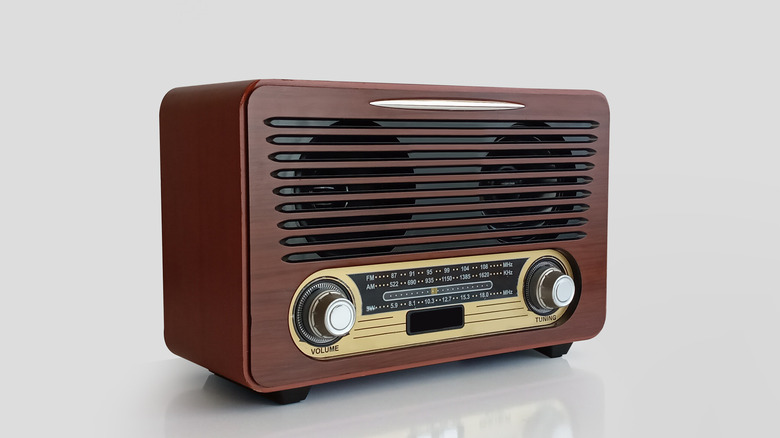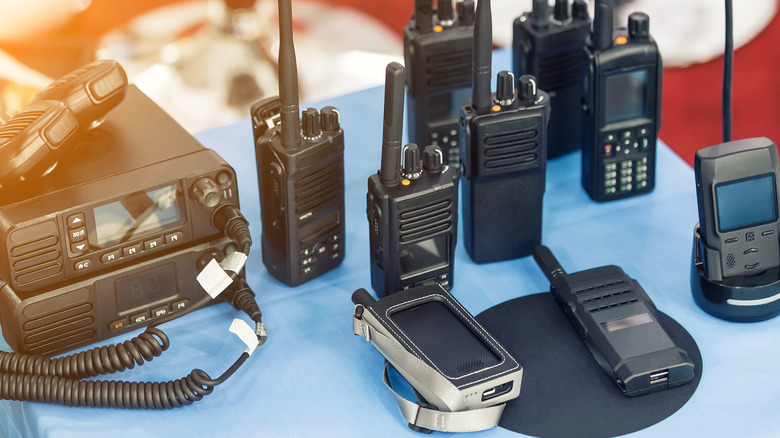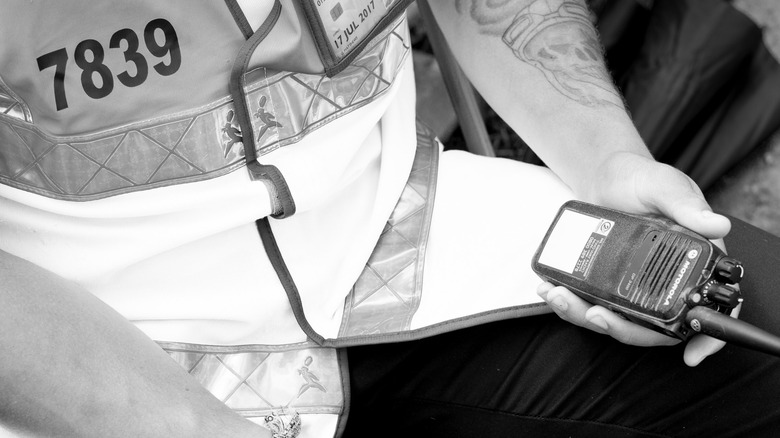What Do 10-4 And Other Radio Codes Mean?
If you've ever seen a movie about war, police, or pilots, you've probably noticed it's a little hard to understand them. They call out words like "foxtrot" and "tango," and while it sounds like gibberish to us, the characters seem to understand each other.
It might seem like they're speaking to one another in code — and that's because they are. In the past, anyone using a two-way radio would be expected to use shorthand to get their messages across, whether to avoid technological issues or to keep the airwaves clear of chatter (via Dictionary.com). It isn't gibberish. Every "Wilco," "Roger," and "10-4" means something very specific and allows the radio users to communicate quickly without misunderstanding each other.
But where did those words come from? There are multiple types of codes to choose from, and each one has its own unique story of how it came to be (via Mental Floss).
10-4 and other numbers
One of the most popular phrases you've probably heard is "10-4." The two numbers don't seem like much on their own, but the phrase is part of a larger category of radio lingo called the "ten-codes" (via Mental Floss). The ten-codes are messages consisting of the number 10, followed by a second number that indicates a specific issue. Using "10-4" basically means "I understand you."
The ten-codes were invented in the late 1930s by Charles Hopper, who served as communications director for the Illinois State Police at the time. At the time, radios took a few seconds to turn on and begin transmitting, and the "10" gave the machine time to get going before the important part of the message (via Dictionary.com).
The codes aren't as common as they used to be. That's because the codes aren't the same everywhere, which can cause confusion when different departments have to work together. According to Chicago Communications, some officials are pushing to drop them completely.
Roger that
Much like "10-4," the code "Roger that" is pretty frequently used in place of "I understand" or "I hear you," according to Mental Floss. The origins of this phrase, though, are a little different. Instead of being part of a set of codified terms, it's based on techniques from another form of communication: the telegraph.
When telegraphs were common, operators would use the letter "R" — represented by the pattern "dot-dash-dot" — to mean "message received." The same idea was translated to radio communication when it started to take the place of telegraphs. But instead of the Morse code for a letter, they substituted it with "Roger," which symbolizes the letter "R" in the phonetic alphabet used by militaries (via Chicago Communications). Still, while the phrase "Roger that" confirms a message has been received, it doesn't necessarily mean that the order will be followed.
Origins of the phonetic alphabet
There are plenty of other words that come from the phonetic alphabet, just like the phrase "Roger that." The alphabet was created so that members of military or naval forces could spell out codes or phrases without relying on the letters themselves, according to Mental Floss. For example, letters like "B," "C," "D," and "E" tend to sound pretty similar, so spelling a word out with phrases like "Bravo," "Charlie," "Delta," and "Echo" would ensure nothing was misunderstood.
The Joint Army/Navy Phonetic Alphabet has gone through its own changes. Initially, each branch had its own alphabet, according to the North Atlantic Treaty Organization. The unified option was created in the 1940s for use by all three United States military branches. It was then replaced by a similar alphabet about 15 years later, and some of the terms from that alphabet are still in use today.
Mayday and emergency responses
One of the most common terms you might hear in movies is one you hopefully won't ever hear in real life: "Mayday." According to Mental Floss, the term is used all over the world to alert other radio users to a life-threatening emergency. The phrase doesn't come from the standard phonetic alphabet or a numerical code, either — the word was chosen because it needed to stand out and be easily identifiable to both English- and French-speaking radio users.
The word "mayday" was selected as an emergency signal by British radio officer Frederick Stanley Mockford in 1923. Because his airport primarily dealt with flights from Paris, he opted for a word that could be understood in both languages ("Mayday" is meant to resemble "m'aider," which is also a French call for help). There are a lot of rules controlling the use of a "mayday" signal. You've likely heard it said three times in a row, and that's because the goal is to keep it from being confused with any other phrases.
Wilco and other less common phrases
There are plenty of other terms used in radio lingo, from additional ten-codes to shortened words. The most common of those is probably "Wilco," which is used in place of "I will comply" (via Chicago Communications). According to Mental Floss, codes like "Roger that" and "10-4" don't have to mean the listener is complying with the order, so "Wilco" covers that gap. Other messages may include ten-codes like "10-77," which indicates arrival time, or "10-1," which lets the recipient know there's bad radio reception.
Although some radio lingo has fallen by the wayside as more modern communications have developed, the phrases themselves have stuck around. The phonetic alphabet, shortened words, and 10-4 codes all come together to create the complicated mix of lingo and jargon you might hear during your favorite action movie. Now you know how to understand exactly what they're saying.





